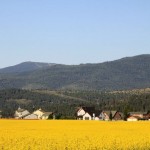by Catherine Haug, April 8, 2013
(photo, right, by Devvi Morgan)
On January 15, 2013, Kalispell CHS General Manager Mark Lalum and Bigfork’s Duane Johnson, owner of Clearwater Biologicals (vegetable oil milling) gave a presentation to the Flathead County Democratic Party and Central Committee at the Swan River Community Hall. Matt Naber reports (in the January 23 issue of the Bigfork Eagle) that agriculture is on the rise in the Flathead. From the article:
[According to] Kalispell CHS General Manager Mark Lalum …“Ag is considered a new wealth industry. It’s what’s making us have a higher standard of living because it’s bringing in wealth.” … Alfalfa’s worth increases to $1,950 per acre once turned into cubes or pellets. Canola’s value per acre increases to $1,314.46 per acre, and camelina’s increases to $2,493.09 per acre once processed [to oils].
Indeed, this is big money. However, please note that ALL 3 of these crops are GMO. I suspect that if a monetary evaluation of the harm done by GMO crops to our soil, water, and health were completed, it would show our collective citizen wealth in a tumult.
Across our nation, most of the acreage producing these crops are corporate farms owned by Big Ag companies like Monsanto. While this may not be true in the Flathead today, the potential to make big money from these crops could lure the corporations to our valley.
The article goes on to discuss the premium value of Montana wheat:
“Montana winter wheat is considered premium quality wheat in the world,” Lalum said. “Japan and Korea, they want specifically Montana winter wheat.” However, Mexico is currently the leading consumer of Montanan wheat. Flathead Valley’s wheat has issues with dough strength and is more commonly sold to countries such as Vietnam according to Lalum.
As an observer of agricultural land in the Flathead, I see more and more of our good soil growing housing and business developments, not crops. At some point, there will not be enough cultivatable soil left to feed our valley’s population, as population explodes and land is developed. Isn’t anyone (with political clout) seriously looking at this problem?
Is this what we citizens want, that the wealth produced by our good soil goes to corporate coffers while our citizens suffer from low wages and want of nutritious food? It’s time for us to speak up. It’s time for us to use our political clout!
What you can do
You can start by becoming involved in the non-GMO movement:
- Learn everything you can about GMOs: what they are, how they work, the harm they create. See also the IRT’s Resources page.
- A good place to start is to view Genetic Roulette 9documentary film); see Institute for Responsible Technology (IRT) for more; view the trailer on YouTube; and watch for showings around the valley.
- Read articles about GMOs on this site.
- Make a commitment to boycott companies that make processed foods containing GMO ingredients.
- Write your legislators at both state and federal level about the problem of GMOs.
- Join the Non-GMO Tipping Point Network (contact Cat for more info). Help distribute informational pamphlets and the Non-GMO Shopping Guide (pdf).
- Become involved in the classroom to inform our youth about good food habits and the harm of processed food and GMO foods.
- Work with our local schools to create and maintain an Organic garden for children to get close to the soil and the healthful foods they can grow.
If the loss of our good, fertile soil to housing and business developments concerns you,
- Become active in sensible zoning to set aside fertile land for ag-use only.
- Work with our county and local government to give teeth to zoning regulations.
